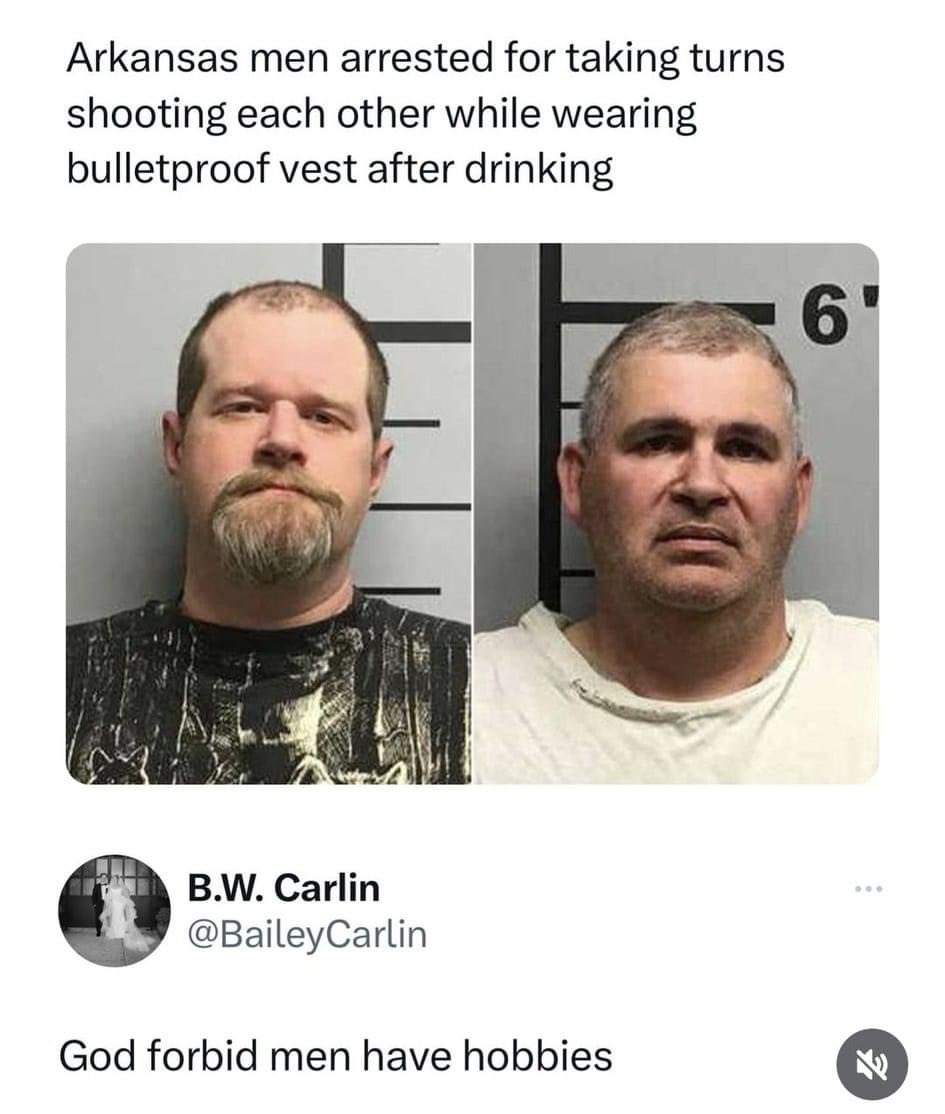this post was submitted on 10 Sep 2024
730 points (98.7% liked)
JustGuysBeingDudes
1184 readers
1 users here now
founded 2 years ago
MODERATORS
you are viewing a single comment's thread
view the rest of the comments
view the rest of the comments

Yeah, at least according to the laws in the US! Consent while intoxicated pretty much only refers to sex, or near sexual acts. In any other case, the fact that you intoxicated yourself to the point of making bad decisions, that's on you (voluntary intoxication).
Like for instance, these gentlemen both agreed to shoot each other while drunk, that would only make either of their consequences worse if there was a death, it wouldn't absolve them of their decisions to do it. They chose to get drunk, they chose to make bad decisions with guns, there is no consent issue there.
There are a couple exceptions, like you CAN enter into a contract while drunk, but if it was proveably in bad faith for the other party, it can be voided. So you can't necessarily be taken advantage of for contract purposes, even if you are voluntarily intoxicated.
Again, IANAL. I'm just pointing out consent doesn't apply in this situation. Especially since, according to being arrested, they were agreeing to perform an illegal act, or an act in an illegal way. The illegality of the act was not based on consent at all, unlike sex.
Actually refers to all forms of legal consent. A contract can be void if the other party is too drunk (to the point of legal incapacity). You also can't gain informed consent for medical procedures if the other party is too drunk.
Civil rules about preponderance of evidence and if it's just a he said she said situation that you were obviously incapacitated usually means that you won't successfully void a contact because you were drunk though
That's fair I think, consent in context of contracts (however not appropriate for this example). To your point the law does specify a point of being too drunk (black out, incapacitated), and the definition of that point, and if you were at that point can be argued in court. Even if you are not incapacitated, a contract in bad faith when alcohol is involved can also be voided (like I mentioned).
But medically if you are unable to give consent due to intoxication, that means they can do whatever they think they need to, to keep you alive. Unless you have an advanced directive or a family member that can legally make decisions for you. So that's totally opposite.
Consent isn't an argument with regards criminal charges, except sex. It's the only case in which consent changes a legal act into an illegal act.
You can't legally consent to a crime period, you can choose not to press charges for that crime, but there's no consent for an illegal act, unless you've entered into a contract in some way.
On the medical front it's actually a big consideration for us. If we give someone benzos and then someone tries to get consent for a non-emergent endoscopy, for example, that consent may not be valid. The level of "intoxication" someone has before we don't consider informed consent valid is pretty low.
"If we give someone benzos..."
Exactly! That would not be described as voluntary intoxication for this example, you as the hospital are responsible for his state.
If a person came in via the ambulance because they are in the midst of an episode of alcohol poisoning and are non-verbal, do you wait to take action until they can consent? You see what I'm saying?
No, but let's say that same person came in with a report of vomiting blood, suggesting esophageal varacies which are common in alcoholics due to hepatic portal hypertension but their hematocrit is stable. The next course of action would be to perform an upper endoscopy to see if those varacies are treatable before they really pop and the person bleeds out. That procedure would require informed consent, since it's not emergent even if it is a direct threat to their survival.
Yeah, that makes sense. This all tracking with my examples and I'm pretty sure we agree here! Is this person awake or not? Is informed consent required when delayed treatment would be dangerous if the person came in in an alerted state, comatose, etc.? Being voluntarily intoxicated to the point of being a danger to your own life gets your consent ignored in many cases because most of the time society won't allow a person to just die.
I think I take your point about consent being not just sex in that context, but the medical version doesn't really apply here.